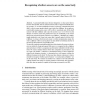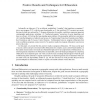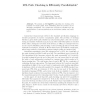55 search results - page 11 / 11 » Stop-and-Go-MIXes Providing Probabilistic Anonymity in an Op... |
BMCBI
2010
13 years 7 months ago
2010
Background: Several diseases, many of which nowadays pandemic, consist of multifactorial pathologies. Paradigmatic examples come from the immune response to pathogens, in which ca...
PERVASIVE
2011
Springer
12 years 10 months ago
2011
Springer
As personal health sensors become ubiquitous, we also expect them to become interoperable. That is, instead of closed, end-to-end personal health sensing systems, we envision stand...
EUROCRYPT
2004
Springer
14 years 12 days ago
2004
Springer
Informally, an obfuscator O is an efficient, probabilistic “compiler” that transforms a program P into a new program O(P) with the same functionality as P, but such that O(P)...
ICALP
2009
Springer
14 years 7 months ago
2009
Springer
We present an AC1 (logDCFL) algorithm for checking LTL formulas over finite paths, thus establishing that the problem can be efficiently parallelized. Our construction provides a f...
DEBU
2008
13 years 7 months ago
2008
The open nature of collaborative recommender systems allows attackers who inject biased profile data to have a significant impact on the recommendations produced. Standard memory-...



